Dear Zazie, Here is today’s Lover’s Chronicle by me as Mac Tag takes the day off. Follow us on twitter @cowboycoleridge. Has someone told you two out of three ain’t bad? Have you told someone two out of three ain’t bad? Rhett
The Lovers’ Chronicle
© copyright 2020 mac tag/cowboy coleridge all rights reserved
movin’ verse
written day by day
the more given
the more repaid
that i was not, but
bein’, i can again
no longer removed
from those charms
we are never far,
with so lovely eyes
thus it befalls
that though
once so,
in a certain sort,
here we are
never knowin’
anything like this
© Copyright 2019 Mac tag/cowboy Coleridge all rights reserved
moved by all things
extraordinary
fancies and whims
that gather ’round
the imaginin’s
of days bygone
and present
no more fear
nothin’
can hurt or heal
now that the moments
of ecstasy and desire
are all past
no shame in not findin’
what was sought
you know,
there is another way
© copyright 2018 mac tag/cowboy coleridge all rights reserved
Hey this is Rhett and I am takin’ over the reins on The Lovers’ Chronicle. We have a sonnet inspired by Samuel Butler‘s “Sonnet on Miss Savage”. We do not think he will mind us borrowin’ a few lines, he has been dead for over 300 years. You know how we have a weakness here at TLA for dead poets and sonnets. The Poem of the Day:
Sonnet, She was too kind
She was too kind, wooed too persistently,
Wrote movin’ letters to me day by day;
But I was as unmoved as I could be,
The more she gave, the less could I repay.
Therefore I grieve, not that I was not loved,
But, bein’ loved, I could not love again.
I had lust, but stayed from love far removed;
Hard though I tried to love I tried in vain.
Of beauty and charms, she was never short,
With so lovely eyes. Thus hence it befell
That though I loved her in a certain sort,
Was it then unwise to not love her well?
I want and need you but, do not be sad,
I said, because two out of three ain’t bad.
© Copyright 2012 mac tag/cowboy Coleridge all rights reserved
The Song of the Day is “Two Out of Three Ain’t Bad” by Meatloaf we do not own the rights to this song. no copyright infringement intended.
| Théodore Gericault | |
|---|---|

by Alexandre-Marie Colin, 1816
|
|
Today is the birthday of Théodore Géricault (Jean-Louis André Théodore Géricault; Rouen, Normandy; 26 September 1791 – 26 January 1824 Paris); painter and lithographer, known for The Raft of the Medusa. Although he died young, he was one of the pioneers of the Romantic movement.
A trip to Florence, Rome, and Naples (1816–17), prompted in part by the desire to flee from a romantic entanglement with his aunt.
Gallery
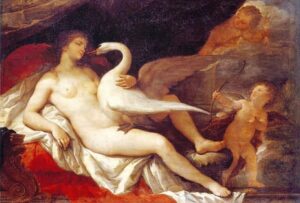
Leda e il cigno
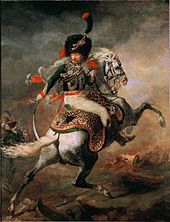


-

Bust of a Black Man, 1808 (Ajuda National Palace)
-

Wounded Cuirassier Leaving the Field of Battle, 1814
-
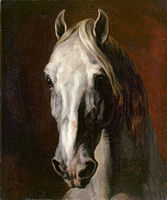
Horse Head, 1815
-

Riderless Racers in Rome, 1817 (The Walters Art Museum)
-

The Capture of a Wild Horse, 1817
-

Portrait of Laure Bro, 1818
-

Heroic Landscape with Fishermen, 1818
-

Portrait Study of a Youth, ca. 1818–1820
-

Horse in the Storm, 1820–1821
-
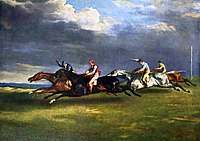
The Derby of Epsom, 1821
-

The Kiss, charcoal, sepia wash and white gouache on paper, ca. 1822
-

White Arabian Horse, before 1824
-

Nude, Musée Bonnat (Bayonne)
-

Portrait of a Kleptomaniac, 1822 (Museum of Fine Arts, Ghent)
-

The Woman with a Gambling Mania, 1822 (Louvre, Paris)
-
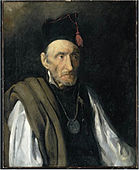
Man Suffering from Delusions of Military Rank, 1822 (Collection Oskar Reinhart am Römerholz, Winterthur)
-
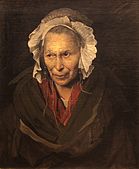
La Monomane de l’envie (Insane Woman), 1822 (Museum of Fine Arts of Lyon)
-

A kidnapper, 1822–1823 (Museum of Fine Arts, Springfield, Massachusetts)
Today is the birthday of Albert Lynch (Alberto Fernando Lynch; Gleisweiler, Kingdom of Prussia (Germany) 26 september 1860 – 1950 Monaco); painter and illustrator of Peruvian/German ancestry.
The women of his time were his favorite subject to paint and he preferred pastel, gouache and watercolor although he occasionally worked in the oil technique. His work maintained the spirit of the Belle Époque. He illustrated such books as Lady of the Camellias by Alexandre Dumas, fils, Le Père Goriot by Honoré de Balzac and La Parisienne by Henry Becque.
Lynch moved to Monaco in 1930, where he died, survived by his wife Marie Anna Victoria Bacouel, who he had married in Paris on 28 October 1896.
Gallery
| T. S. Eliot | |
|---|---|
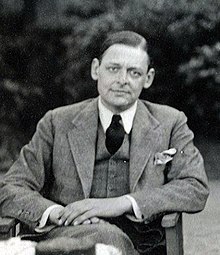
Eliot in 1934
|
|
And today is the birthday of T. S. Eliot (Thomas Stearns Eliot; St. Louis, Missouri; 26 September 1888 – 4 January 1965 Kensington); essayist, publisher, playwright, literary and social critic and in my opinion, one of the twentieth century’s major poets. He moved to England in 1914 at age 25, settling, working and marrying there. He was eventually naturalised as a British subject in 1927 at age 39, renouncing his American citizenship.
Eliot attracted widespread attention for his poem “The Love Song of J. Alfred Prufrock” (1915), which is seen as a masterpiece of the Modernist movement. It was followed by some of the best-known poems in the English language, including The Waste Land (1922), “The Hollow Men” (1925), “Ash Wednesday” (1930) and Four Quartets (1945). He is also known for his seven plays, particularly Murder in the Cathedral (1935). He was awarded the Nobel Prize in Literature in 1948.
Before leaving the US, Eliot had told Emily Hale that he was in love with her. He exchanged letters with her from Oxford during 1914 and 1915, but they did not meet again until 1927. In a letter to Conrad Aiken late in December 1914, Eliot, aged 26, wrote: “I am very dependent upon women (I mean female society).” Less than four months later, Thayer introduced Eliot to Vivienne Haigh-Wood, a Cambridge governess. They were married at Hampstead Register Office on 26 June 1915.
After a short visit, alone, to his family in the United States, Eliot returned to London and took several teaching jobs, such as lecturing at Birkbeck College, University of London. The philosopher Bertrand Russell took an interest in Vivienne while the newlyweds stayed in his flat. Some scholars have suggested that she and Russell had an affair, but the allegations were never confirmed.
The marriage was markedly unhappy, in part because of Vivienne’s health problems. In a letter addressed to Ezra Pound, she covers an extensive list of her symptoms, which included a habitually high temperature, fatigue, insomnia, migraines, and colitis. This, coupled with apparent mental instability, meant that she was often sent away by Eliot and her doctors for extended periods of time in the hope of improving her health. And as time went on, he became increasingly detached from her. The couple formally separated in 1933 and in 1938 Vivienne’s brother, Maurice, had her committed to a mental hospital, against her will, where she remained until her death of heart disease in 1947.
Their relationship became the subject of a 1984 play Tom & Viv, which in 1994 was adapted as a film of the same name.
In a private paper written in his sixties, Eliot confessed: “I came to persuade myself that I was in love with Vivienne simply because I wanted to burn my boats and commit myself to staying in England. And she persuaded herself (also under the influence of [Ezra] Pound) that she would save the poet by keeping him in England. To her, the marriage brought no happiness. To me, it brought the state of mind out of which came The Waste Land.”
By 1932, Eliot had been contemplating a separation from his wife for some time. When Harvard offered him the Charles Eliot Norton professorship for the 1932–1933 academic year, he accepted and left Vivienne in England. Upon his return, he arranged for a formal separation from her, avoiding all but one meeting with her between his leaving for America in 1932 and her death in 1947. Vivienne was committed to the Northumberland House mental hospital in Woodberry Down, Manor House, London, in 1938, and remained there until she died. Although Eliot was still legally her husband, he never visited her. From 1933 to 1946 Eliot had a close emotional relationship with Emily Hale. Eliot later destroyed Hale’s letters to him, but Hale donated Eliot’s to Princeton University Library where they were sealed until 2020. When Eliot heard of the donation he deposited his own account of their relationship with Harvard University to be opened whenever the Princeton letters were.
From 1938 to 1957 Eliot’s public companion was Mary Trevelyan of London University, who wanted to marry him and left a detailed memoir.
On 10 January 1957, at the age of 68, Eliot married Esmé Valerie Fletcher, who was 30. In contrast to his first marriage, Eliot knew Fletcher well, as she had been his secretary at Faber and Faber since August 1949. They kept their wedding secret; the ceremony was held in St. Barnabas’ Church, Kensington, London, at 6:15 am with virtually no one in attendance other than his wife’s parents. Eliot had no children with either of his wives. In the early 1960s, by then in failing health, Eliot worked as an editor for the Wesleyan University Press, seeking new poets in Europe for publication. After Eliot’s death, Valerie dedicated her time to preserving his legacy, by editing and annotating The Letters of T. S. Eliot and a facsimile of the draft of The Waste Land. Valerie Eliot died on 9 November 2012 at her home in London.
Verse
I am moved by fancies that are curled
Around these images, and cling:
The notion of some infinitely gentle
Infinitely suffering thing.
- “Preludes” (1917), § IV
I was neither
Living nor dead, and I knew nothing,
Looking into the heart of light, the silence.
- The Waste Land (1922) Line 39 et seq.
Who is the third who walks always beside you
When I count, there are only you and I together
But when I look ahead up the white road
There is always another one walking beside you
- The Waste Land Line 359 et seq.
In this decayed hole among the mountains
In the faint moonlight, the grass is singing
Over the tumbled graves, about the chapel
There is the empty chapel, only the wind’s home.
- The Waste Land Line 385 et seq.
The Hollow Men (1925)
- We are the hollow men
We are the stuffed men
Leaning together
Headpiece filled with straw.
- Those who have crossed
With direct eyes, to death’s other Kingdom
Remember us — if at all — not as lost
Violent souls, but only
As the hollow men
The stuffed men.
- Between the idea
And the reality
Between the motion
And the act
Falls the Shadow
-
- For Thine is the Kingdom.
- Between the conception
And the creation
Between the emotion
And the response
Falls the Shadow
-
- Life is very long.
- Between the desire
And the spasm
Between the potency
And the existence
Between the essence
And the descent
Falls the Shadow .
- This is the way the world ends
This is the way the world ends
This is the way the world ends
Not with a bang but a whimper.
The Cocktail Party (1949)
- It will do you no harm to find yourself ridiculous.
Resign yourself to be the fool you are.
- You will find that you survive humiliation
And that’s an experience of incalculable value.
- That is the worst moment, when you feel you have lost
The desires for all that was most desirable,
Before you are contented with what you can desire;
Before you know what is left to be desired;
And you go on wishing that you could desire
What desire has left behind. But you cannot understand.
How could you understand what it is to feel old?
- You will change your mind, but you are not free.
Your moment of freedom was yesterday.
You made a decision. You set in motion
Forces in your life and in the lives of others
Which cannot be reversed.
It’s not that I’m afraid of being hurt again:
Nothing again can either hurt or heal.
I have thought at moments that the ecstasy is real
Although those who experience it may have no reality.
For what happened is remembered like a dream
In which one is exalted by intensity of loving
In the spirit, a vibration of delight
Without desire, for desire is fulfilled
In the delight of loving. A state one does not know
When awake. But what, or whom I love,
Or what in me was loving, I do not know.
And if all that is meaningless, I want to be cured
Of a craving for something I cannot find
And of the shame of never finding it.
There is another way, if you have the courage.
The first I could describe in familiar terms
Because you have seen it, as we all have seen it,
Illustrated, more or less, in lives of those about us.
The second is unknown, and so requires faith —
The kind of faith that issues from despair.
The destination cannot be described;
You will know very little until you get there;
You will journey blind. But the way leads towards possession
Of what you have sought for in the wrong place.
Rhett

No Comments on "The Lovers’ Chronicle 26 September – another way – art by Théodore Géricault & Albert Lynch – verse by T. S. Eliot"